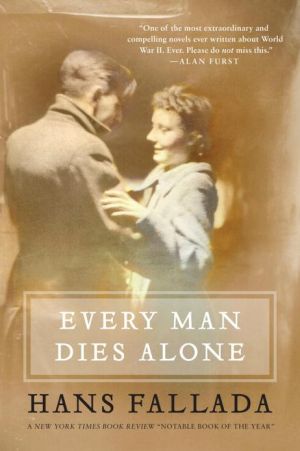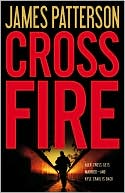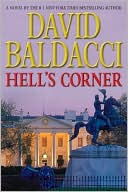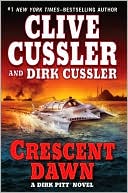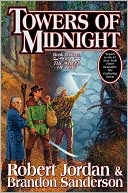Every Man Dies Alone
“To read Every Man Dies Alone, Fallada’s testament to the darkest years of the 20th century, is to be accompanied by a wise, somber ghost who grips your shoulder and whispers in your ear: 'This is how it was. This is what happened.'” \ —The New York Times Book Review\ \ “I very much enjoyed the rediscovery of Hans Fallada ... a wonderful novel. Compelling.” \ —Ian McEwan\ This never-before-translated masterpiece—by a heroic best-selling writer who saw his life crumble when he wouldn’t...
Search in google:
This never-before-translated masterpiece—by a heroic best-selling writer who saw his life crumble when he wouldn’t join the Nazi Party—is based on a true story. It presents a richly detailed portrait of life in Berlin under the Nazis and tells the sweeping saga of one working-class couple who decides to take a stand when their only son is killed at the front. With nothing but their grief and each other against the awesome power of the Reich, they launch a simple, clandestine resistance campaign that soon has an enraged Gestapo on their trail, and a world of terrified neighbors and cynical snitches ready to turn them in. In the end, it’s more than an edge-of-your-seat thriller, more than a moving romance, even more than literature of the highest order—it’s a deeply stirring story of two people standing up for what’s right, and for each other. The Barnes & Noble ReviewHans Fallada, as he became known to the world, was born Rudolf Ditzen in Germany on the Baltic seaboard in 1893. A bestselling writer, he was admired and distrusted by the Nazis and later embraced by East German Communists. He was also an alcoholic, drug addict, philanderer, embezzler, and failed suicide. He was a duelist who killed his best friend; a madman who went after his ex-wife with a gun; and an on-and-off inmate of prisons and insane asylums. He died in 1947 at age 53.
Chapter One\ Some Bad News\ The postwoman Eva Kluge slowly climbs the steps of 55 Jablonski Strasse. She’s tired from her round, but she also has one of those letters in her bag that she hates to deliver, and is about to have to deliver, to the Quangels, on the second floor.\ Before that, on the floor below, she has a Party circular for the Persickes. Persicke is some political functionary or other — Eva Kluge always gets the titles mixed up. At any rate, she has to remember to call out “Heil Hitler!” at the Persickes’ and watch her lip. Which she needs to do anyway, there’s not many people to whom Eva Kluge can say what she thinks. Not that she’s a political animal, she’s just an ordinary woman, but as a woman she’s of the view that you don’t put children in the world to have them shot. Also, that a home without a man is no good, and for the time being she’s got nothing: not her two boys, not a man, not a proper home. So, she has to keep her lip buttoned, and deliver horrible field letters that aren’t written but typed, and are signed ‘Regimental Adjutant’.\ She rings the bell at the Persickes’, says “Heil Hitler!” and hands the old drunk his circular. He has his party badge on his lapel, and he asks: ‘Well, so what’s new?’\ She replies: “Haven’t you heard the special report? France has capitulated.”\ Persicke’s not content with that. “Come on, Miss, of course I knew that; but to hear you say it, it’s like you were selling stale rolls. Say it like it meant something! It’s your job to tell everyone who doesn’t have a radio, and convince the last of the moaners. The second Blitzkrieg is in the bag now, it’s England now! In another three months, the Tommies will be finished, and then we’ll see what the Fuhrer has in store for us. Then it’ll be the turn of the others to bleed, and we’ll be the masters. Come on in, and have a schnapps with us. Amalie, Erna, August, Adolf, Baldur — let’s be having you. Today we’re celebrating, we’re not working today. Today we’ll wet the news, and in the afternoon we’ll go and pay a call on the Jewish lady on the fourth floor, and see if she won’t treat us to coffee and cake! I tell you, there’ll be no mercy for that bitch any more!”\ While Mr. Persicke, ringed by his family launches into increasingly wild vituperative and starts hitting the schnapps, the postie has climbed another flight of stairs and rung the Quangels’ bell. She’s already holding the letter out in her hand, ready to run off the second she’s handed it over. And she’s in luck: it’s not the woman who answers the door — she usually likes to exchange a few pleasantries — but the man with the etched, birdlike face, the thin lips, and the cold eyes. He takes the letter out of her hand without a word and pushes the door shut in her face, as if she was a thief, someone you had to be on your guard against.\ Eva Kluge shrugs her shoulders and turns to go back downstairs. Some people are like that; in all the time she’s delivered mail in the Jablonski Strasse, that man has yet to say a single word to her. Well, let him be, she can’t change him, she couldn’t even change the man she’s married to, who wastes his money sitting in bars and betting on horses, and only ever shows his face at home when he’s skint.\ At the Persickes’ they’ve left the apartment door open, she can hear the glasses and the rowdy celebrations. The postwoman gently pulls the door shut and carries on downstairs. She thinks the speedy victory over France might actually be good news, because it will have brought the end of the war nearer. And then she’ll have her two boys back.\ The only fly in the ointment is the uncomfortable realization that people like the Persickes will come out on top. To have the likes of them as masters and always have to mind your p’s and q’s, that doesn’t strike her as right either.\ Briefly she thinks of the man with the bird face who she gave the field post letter to, and she thinks of old Mrs. Rosenthal up on the fourth floor, whose husband the Gestapo took away two weeks ago. You had to feel sorry for someone like that. The Rosenthals used to have a little haberdashery shop on Prenzlauer Allee. That was Aryanized, and now the man’s disappeared, and he can’t be far short of seventy. Those two old people can’t have done any harm to anyone, they always allowed credit — they did it for Eva Kluge too when she couldn’t afford new clothes for the kids — and the goods were certainly no dearer or worse in quality than elsewhere. No, Eva Kluge can’t get it into her head that a man like Rosenthal is any worse than the Persickes, just by virtue of him being a Jew. And now the old woman is sitting in her flat all alone, and doesn’t dare go outside. It’s only after dark that she goes and does her shopping with her yellow star, probably she’s hungry. No, thinks Eva Kluge, even if we defeat France ten times over, it doesn’t mean there’s any justice here at home...\ And by now she’s reached the next house, and she makes her deliveries there.\ In the meantime shop foreman Otto Quangel has taken the field post letter into the parlor and propped it against the sewing machine. “There!” he says, nothing more. He always leaves the letters for his wife to open, knowing how devoted she is to their only son Otto. Now he stands facing her, biting his thin under lip, waiting for her smile to light up. In his quiet, undemonstrative way, he loves this woman very much.\ She has torn open the envelope, for a brief moment there really was a smile lighting up her face, and then it vanished when she saw the typed letter. Her face grew apprehensive, she read more and more slowly, as though afraid of what each next word might be. The man has leaned forward and taken his hands out of his pockets. He is biting his underlip quite hard now, he senses something terrible has happened. It’s perfectly silent in their parlor. Only now does the woman’s breathing come with a gasp.\ Suddenly she emits a soft scream, a sound her husband has never heard from her. Her head rolls forward, bangs against the spools of thread on her sewing machine, and comes to rest among the folds of sewing, covering the fateful letter.\ In a couple of bounds Quangel is at her side. With uncharacteristic haste he places his big, work-toughened hand on her back. He can feel his wife trembling all over. “Anna!” he says, “Anna, please!” He waits for a moment, and then he says it: “Has something happened to Otto? Is he wounded, is it bad?”\ His wife’s body continues to tremble, her mouth doesn’t make a sound. She makes no effort to raise her head to look at him.\ He looks down at her hair, it’s gotten thin in the many years of their marriage. They are getting old; if something serious has happened to Otto, she will have no one to love, only him, and there’s not much to love about him. He doesn’t have words to tell her ever how much he feels for her. Even now he’s not able to stroke her, be tender to her, comfort her a little. It’s all he can do to rest his heavy hand on her hair, pull her head up as gently as he can, and softly say: “Anna, will you tell me what’s in the letter?”\ But even though her eyes are now very near to his, she keeps them shut tight, she won’t look at him. Her face is a sickly yellow, her usual healthy color is gone. The flesh over her bones seems to have melted away, it’s like looking at a skull. Only her cheeks and mouth continue to tremble, as her whole body trembles, caught up in some mysterious inner quake.\ As Quangel gazes into this so familiar, and now so strange face, as he feels his heart pounding harder and harder, as he feels his complete inability to afford her the least comfort, he is gripped by a deep fear. A ridiculous fear really, compared to the deep pain of his wife, but he is afraid that she might start to scream, scream louder and wilder than she did a moment ago. He was always one for peace and quiet, he didn’t want anyone to know anything about the Quangels at home. And as for giving vent to feelings: no, thank you! But even in the grip of his fear, the man isn’t able to say any more than he did a moment ago: “What is it in the letter? Tell me, Anna!”\ The letter is lying there plain to see, but he doesn’t dare to reach for it. He would have to let go his wife’s head, and he knows that this head — there are two bloody welts on it from the sewing machine — would only slump once more. He masters himself, asks again: “What’s happened with Ottochen?”\ It’s as though the pet name, one that the man hardly ever used, recalled the woman from the world of her pain back into life. She gulps a couple of times, she even opens her eyes, which are very blue, and now look bled white. “With Ottochen?” she says in a near whisper. “What do you think’s happened? Nothing has happened, there is no Ottochen any more, that’s all!”\ “Oh!’ the man says, just a deep “Oh!” from the core of his heart. Without knowing what he’s doing, he’s let go his wife’s head, and has reached for the letter. His eyes stare at the lines, without being able to decipher them.\ Thereupon the woman grabs the letter from him. Her mood has swung round, furiously she rips the piece of paper into scraps and shreds and fragments, and she shouts into his face: “What do you even want to read that filth for, those common lies they always write? That he died a hero’s death for Fuhrer and Fatherland? That he was an exemplary soldier and comrade? Do you want to hear that from them, when you know yourself that Ottochen liked nothing better than fiddling about with his radio kits, and that he cried when he was called away to be a soldier? How often he used to say to me when he was recruited that he would give his right hand to be able to get away from them? And now he’s supposed to be an exemplary soldier, and died a hero’s death? Lies, all a pack of lies! But that’s what you get from your wretched war, you and that Fuhrer of yours!”\ Now she’s standing in front of him, the woman, so much shorter than he is, but with eyes sparkling with fury.\ “Me and my Fuhrer?” he mumbles, stunned by this attack. “Since when is he my Fuhrer? I’m not even in the Party, just in the Arbeitsfront, and everyone has to join that. As for voting for him, I only did that once, and so did you.”\ He says it in his slow and cumbersome manner, not so much to defend himself as to clarify the facts. He still can’t understand what induced her to mount this sudden attack on him. They were always of one mind...\ But she says heatedly: “What gives you the right to be the man in the house and determine everything? If I want so much as a space for my potatoes in the cellar, it has to be the way you want it. And in something as important as this, it’s you who made the wrong decision. But then you creep around everywhere in carpet slippers, you want your peace and quiet and that’s all, and not come to anyone’s attention. So you did the same as they all did, and when they yelled: ‘Fuhrer, give us your orders, we will obey!’ you went with them like a sheep. And the rest of us had to follow you! But now Ottochen’s dead, and no Fuhrer in the world can bring him back, and nor can you!”\ He listened to her without saying a word back. He had never been a man for quarrel and argy-bargy, and he could also tell that it was her pain speaking in her. He was almost glad to have her scolding him, because it meant she wasn’t giving in to her grief. The only thing he said by way of reply was: “One of us will have to tell Trudel.”\ Trudel was Ottochen’s girlfriend, almost his fiancé; she called them Mother and Father. She often dropped in on them for a chat in the evening, even now, with Ottochen away. By day she worked in a uniform factory.\ The mention of Trudel straightaway set Anna Quangel off on a different track. She glanced at the gleaming clock on the mantel, and asked: “Will you have time before your shift?”\ “I’m on from one till eleven today,” he replied. “I’ve got time.”\ “Good,” she said. “Then go, but just ask her to come. Don’t say anything about Ottochen. I’ll tell her myself. Your dinner’ll be ready by midday.”\ “Then I’ll go and ask her to come round tonight,” he said, but he didn’t leave yet, but looked in her jaundiced, ill-looking face. She looked back at him, and for a moment they looked at each other, two people who had been married for almost thirty years, always harmoniously, he quiet and silent, she bringing a bit of life to the place.\ But however much they now looked at each other, they still had no words to say about this thing that had happened, and so he nodded and went out.\ She heard the apartment door close. And no sooner was she certain he was gone than she turned back towards the sewing machine, and swept up the scraps of the fateful field post letter. She tried to put them back together, but quickly saw that it would take too long now, and above all she had to get the dinner ready. So she scooped the pieces into the envelope, and slid it inside her hymnbook. In the afternoon, when Otto was at work, she would have time to fit the pieces together and glue them down. It might all be lies, mean, stupid lies, but it remained the last news she would have had of Ottochen. She would keep it safe, and show it to Trudel. Maybe she would be able to cry then; at the moment it still felt like a flame in her heart. It would do her good to be able to cry!\ She shook her head crossly and went to the stove.
Pt. I The Quangels 9Pt. II The Gestapo 143Pt. III Things Begin to Go Against the Quangels 275Pt. VI The End 383Afterword Geoff Wilkes Wilkes, Geoff 511The True Story Behind Every Man Dies Alone 529The Gestapo File 531
\ From the PublisherA New York Times Book Review Notable Book of the Year\ “The greatest book ever written about the German resistance to the Nazis.” —Primo Levi\ “One of the most extraordinary and compelling novels ever written about World War II. Ever. ... Please, do not miss this.” —Alan Furst\ "It has something of the horror of Conrad, the madness of Dostoyevsky and the chilling menace of Capote’s In Cold Blood.... In the quiet Quangels, Fallada has created an immortal symbol of those who fight back against 'the vile beyond all vileness' and so redeem us all." —Roger Cohen, The New York Times\ “An unrivalled and vivid portrait of life in wartime Berlin.”—Philip Kerr, author of the "Berlin Noir" novels\ “Has the suspense of a John le Carré novel … visceral, chilling ….” —The New Yorker\ \ “One of the most extraordinarily ambitious literary resurrections in recent memory ....” —The Los Angeles Times\ \ “A one-of-a-kind novel … Fallada can be seen as a hero, a writer-hero who survived just long enough to strike back at his oppressors.” —The Globe and Mail\ “Stunningly vivid characters … gets you inside Nazi Germany like no other novel.” —The San Francisco Chronicle\ \ “Essential, thrilling.” —The St. Petersburg Times\ \ “This is a novel that is so powerful, so intense, that it almost hums with electricity." —Minneapolis Star-Tribune\ \ \ \ \ \ Liesl SchillingerRescued from the grave, from decades of forgetting, this novel…testifies to the lasting value of an intact, if battered, conscience…To read Every Man Dies Alone, Fallada's testament to the darkest years of the 20th century, is to be accompanied by a wise, somber ghost who grips your shoulder and whispers into your ear: "This is how it was. This is what happened."\ —The New York Times\ \ \ Publishers WeeklyThis disturbing novel, written in 24 days by a German writer who died in 1947, is inspired by the true story of Otto and Elise Hampel, who scattered postcards advocating civil disobedience throughout war-time Nazi-controlled Berlin. Their fictional counterparts, Otto and Anna Quangel, distribute cards during the war bearing antifascist exhortations and daydream that their work is being passed from person to person, stirring rebellion, but, in fact, almost every card is immediately turned over to authorities. Fallada aptly depicts the paralyzing fear that dominated Hitler's Germany, when decisions that previously would have seemed insignificant-whether to utter a complaint or mourn one's deceased child publicly-can lead to torture and death at the hands of the Gestapo. From the Quangels to a postal worker who quits the Nazi party when she learns that her son committed atrocities and a prison chaplain who smuggles messages to inmates, resistance is measured in subtle but dangerous individual stands. This isn't a novel about bold cells of defiant guerrillas but about a world in which heroism is defined as personal refusal to be corrupted. (Mar.)\ Copyright © Reed Business Information, a division of Reed Elsevier Inc. All rights reserved.\ \ \ \ \ Kirkus ReviewsGrim, powerful epic portrait of life in Germany under Nazi rule, published shortly after the author's death in 1947 but never before available in English. Fallada was a bestselling novelist before the rise of the Third Reich, but during World War II he was hounded by the Gestapo and psychologically brutalized by Joseph Goebbels, who unsuccessfully tried to force him to write an anti-Semitic book. Sinking into alcohol and drug addiction, he was a broken man by the end of his life, and his final novel is shot through with his despair. Written in a 24-day rush, it was inspired by the real-life case of a working-class husband and wife who conducted a covert three-year propaganda campaign against the Nazi regime. Fallada's fictionalized version centers on Otto and Anna Quangel, who are driven to protest after learning that their only son has died fighting at the front. The protest is small and timid: Otto writes anti-Hitler messages on postcards that he distributes around Berlin, and the Quangels are never certain if they influence any hearts or minds. Nonetheless, they provoke the Gestapo. Fallada reveals a deep understanding of the agency's chain of command, its grisly abuses of power and the culture of fear it cultivated among German citizens. His hefty novel includes a host of characters, from hard-drinking reprobates and factory workers to judges and, in a poignant early passage, an elderly Jewish woman in the Quangels' apartment building who lives in a perpetual state of terror. Most of these people are archetypal to a fault: Otto Quangel rarely strays from a stance of stoic nobility, and the drunken, proud bloviations of Gestapo brass occasionally border on the absurd. The characters'fates are clearly telegraphed, yet Fallada keeps readers engaged with passionate prose that rushes events along at a thriller-like pace. And there's stark grandeur in the closing chapters, featuring a Nazi trial, an execution and death in prison. A very welcome resurrection for a great writer crucified by history.\ \ \ \ \ The Barnes & Noble ReviewHans Fallada, as he became known to the world, was born Rudolf Ditzen in Germany on the Baltic seaboard in 1893. A bestselling writer, he was admired and distrusted by the Nazis and later embraced by East German Communists. He was also an alcoholic, drug addict, philanderer, embezzler, and failed suicide. He was a duelist who killed his best friend; a madman who went after his ex-wife with a gun; and an on-and-off inmate of prisons and insane asylums. He died in 1947 at age 53. \ The novel that brought him international renown, Little Man, What Now? was published in 1932 and translated into English in 1933. It was a Book-of-the-Month Club selection and, in 1934, became a Hollywood movie. You can see why. The novel is a Depression extravaganza. It follows roughly a year in the lives of a young German couple, Emma and Johannes Pinneberg, known to each other as "Sonny" and "Lammchen," who marry because the former is pregnant. Their trials present a picture of life in the Weimar Republic, one in which inflation has wiped away old decencies, material and moral, and pervasive unemployment has created a tooth-and-claw scramle for increasingly scarce and demeaning jobs. Though the novel is mawkish at times and contains an element of young-married shtick -- Lammchen doesn't know how to cook; Sonny blows a bundle on a dressing table -- it is also genuinely funny and moving and melancholy in its depiction of that vanished world.\ Fallada was a Dickens and Dostoevsky man. He possessed a similar, inspired vision of the small, resolute doings of the ungreat, of the workers and lower-middle-class people who make their lives as they can amid the heedless, side-swiping forces of economic might and institutional caprice. There is hardship aplenty in Little Man, What Now? but not bleakness. For that, one turns to Every Man Dies Alone, Fallada's last novel, set a decade later and published shortly after the writer's death in 1947. It is now translated for the first time into English, beautifully so, by the distinguished poet and translator Michael Hofmann.\ The germ of the novel lies in a real case, that of Elise and Otto Hampel, who, after Elise's brother was killed early in the war, began dropping subversive messages on postcards all over Berlin. To the fury of both police and Gestapo, they kept this up for almost three years until they were finally identified, arrested, tried, and executed. Fallada does not stray far from this grim outline, except in one critical detail. In the real case, the authorities became convinced that the postcards must be the work of a widespread group of subversives; in the novel they believe it is one man. Indeed, the crime seems more outrageous for its very puniness and the more galling that something so paltry, so irksomely obstinate, so clearly the work of one little man, cannot be stopped.\ Otto Quangel, married to Anna, is a foreman in a furniture factory that now makes crates for bombs and, later, for coffins. The couple are devastated when they learn that their son has been killed in the invasion of France. Otto is determined to fight back in his own small way, to undermine the regime and the war effort by dropping short messages in public places all over Berlin. The first card, he tells Anna, will read: "Mother! The Führer has murdered my son." She shivers; it was, she thinks, "Otto's absolute and irrevocable declaration of war...war between, on the one side, the two of them, poor, small, insignificant workers who could be extinguished for just a word or two, and on the other, the Führer, the Party, the whole apparatus in all its power and glory, with three-fourths or even four-fifths of the German people behind it."\ The Quangels know that many of the cards will be handed in to the authorities immediately, but they also believe that perhaps they will kindle resistance. "In the end," Otto tells his wife, "scores of people, hundreds, will be sitting down and writing cards like us. We will inundate Berlin with postcards, we will slow the machines, we will depose the Führer, end the war..." But no. The cards are quickly turned over to the authorities by terrified citizens who can't get rid of them fast enough; and it strikes the police that it should not be difficult to apprehend the culprit behind them. Still, months pass, a couple of years, and the cards continue, one or two a week.\ Meanwhile the cast of characters expands further, drawing more and more people into what becomes a huge saga. Among them are the other occupants of the Quangel's apartment building: A Jewish woman whose husband has been dragged away by the Gestapo and who cowers alone in her wretched apartment, overstuffed with the goods from their former life; the unwholesome Persicke family, the eldest son a Nazi cadet, the father a Party functionary and drunken bully; Emil Borkhausen, a sneak and a blackmailer, living off his prostitute wife; and Judge Fromm, retired and representing a vestigial trace of justice and honor. One should say at this point that, though the novel's theme is that death is the only freedom remaining under the Third Reich, the way is paved with terrific suspense, lively vignettes of Berlin life, and some very funny episodes, especially those in which the several schemes of its many sleazy opportunists are foiled.\ Beyond the apartment, people from all over Berlin enter the frame, among them the Quangel's son's fiancée, Trudel, who eventually marries another man and is with child, but becomes implicated in a postcard drop. "Ach," she says about Otto, "I wish Dad didn't do such stuff! Doesn't he even think about the trouble and fear he inflicts on people? Life is difficult enough as it is!" Like the couple in Little Man, What Now? she and her husband try to escape into their own private happiness, but what was possible for the Pinnebergs is no more: "They were like a pair of lovers clasped together in a flood, with waves and currents, collapsing houses and the bloated corpses of cattle all around them, still believing they would escape the general devastation if only they stuck together. They had failed to understand that there was no such thing as private life in wartime Germany."\ On the other side of the law, if so it may be termed, members of the police and SS react to the case in different ways. It may not be a far-flung conspiracy, but it offers opportunity to drag people in willy-nilly, following "the watchword of the times: Everyone is guilty. You just need to probe for long enough, and you'll find something." The case fuels the paranoia endemic to all police states and it threatens careers and even the survival of committed Nazis. Among those is one Inspector Escherich, whose failure to find "the hobgoblin," as he calls the unknown culprit, spells his own ruin: "He's got to catch him;" he thinks, "he doesn't care what happens afterward. He has to look this man in the eye; he has to talk to this man who has been the cause of his downfall. He wants to tell that fanatic to his face what panic, ruin, and hardship he has brought to so many people. He wants to crush him, his secret enemy."\ Like those of most people who survived the Nazi regime in Germany, Fallada's record was not completely snowy. He rejected an opportunity to leave the country and altered one novel to create Nazi heroes to suit Goebbels -- later defending himself by saying, "I do not like grand gestures, being slaughtered before the tyrant's throne, senselessly, to the benefit of no one and to the detriment of my children, that is not my way." On the other hand, he refused a request in 1941 to remove Jews and Communists, as well as Nazis (of whom he made sport) from a new edition of Little Man, What Now? By 1944 he was labeled "an undesirable," was drinking ferociously, and was finally locked up in a psychiatric prison. Here he promised to finish writing a novel, about a 1920s banking scandal, that the Nazi Propaganda Ministry expected and, indeed, required, to be usefully anti-Semitic.\ Fallada scribbled away under the eyes of his guards for weeks in lines of tiny script, criss-crossing each other to near indecipherability. The result was The Drinker. Eventually published in 1950, this is the horrifying, though often mordantly funny, story of a man who turns suddenly to drink, ruins himself and his wife, and eventually kills himself in an especially revolting manner. It might also be summed up as a study in self-loathing, surely driven by Fallada's disgust with his existence under the Third Reich. His experience of the fear and sense of impotence, futility, and self-revulsion finally became overt in Every Man Dies Alone, infusing it with a brilliantly bleak irony and terrible power. Upon finishing the novel, Fallada justly declared, "I have finally got it right." --Katherine A. Powers\ Katherine A. Powers writes the literary column "A Reading Life" for the Boston Sunday Globe and lives in Cambridge, Massachusetts.\ \ \
